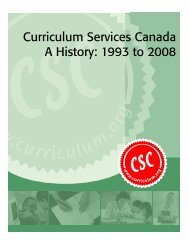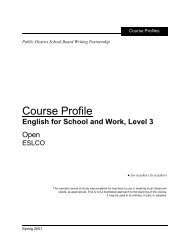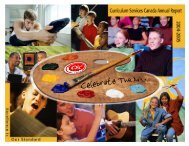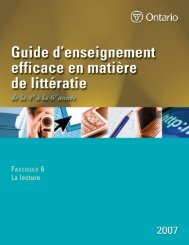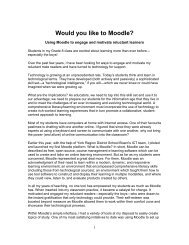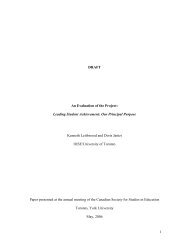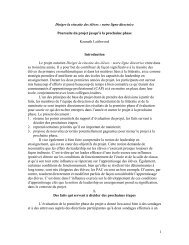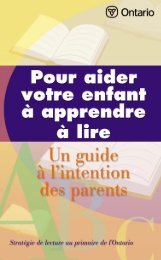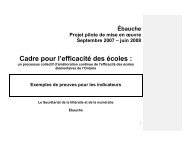Course Profile - Curriculum Services Canada
Course Profile - Curriculum Services Canada
Course Profile - Curriculum Services Canada
You also want an ePaper? Increase the reach of your titles
YUMPU automatically turns print PDFs into web optimized ePapers that Google loves.
5.7.2 Students conference individually with the teacher who provides them with the name(s) of organic<br />
reactants. They must complete the following: build molecular models to represent each reactant,<br />
predict the type of reaction, name and build a model to represent the product(s). The teachers<br />
may choose to provide students with the name(s) of the product(s) and ask students to predict the<br />
reactants and type of reaction. There is also an opportunity to assess students’ Learning Skills.<br />
5.7.3 Written Test.<br />
Assessment Essay/Other (Inquiry, Communication, Making Connections),<br />
Molecular Model Activity (Inquiry, Communication, Making Connections),<br />
Unit Test (Knowledge/Understanding, Making Connections)<br />
Resources<br />
Chemistry Learning Centre – http://learn.chem.vt.edu/tutorials/organic/index.html<br />
General, Organic and Biochem – http://ull.chemistry.uakron.edu/genobc/<br />
Organic Chemistry Resources Worldwide – http://www.organicworldwide.net/<br />
IUPAC Nomenclature – http://www.acdlabs.com/iupac/nomenclature/<br />
The Canadian Society for Chemistry Organic Division – http://publish.uwo.ca/~mworkent/orgdiv/<br />
Mansfield University – http://www.mnsfld.edu/~bganong/102.html<br />
Organic Chemistry, TVO Video Series, 1987.<br />
World of Chemistry, TVO Video Series, 1988 – World of Chemistry: Carbon.<br />
Unit 6: Final Assessment Task<br />
Time: 12 hours<br />
Unit Description<br />
This course has provided students with numerous and varied opportunities to demonstrate the full extent<br />
of their achievement of the curriculum expectations, across all four categories of knowledge and skills.<br />
Thirty per cent of the final grade will be based on a final evaluation in the form of a written examination<br />
and a Performance Task administered towards the end of the course. The Written Examination need not<br />
cover all four Achievement Chart categories if a portion of the expectations in a particular category are<br />
addressed through the Performance Task. The Performance Task requires students to design and conduct<br />
an experiment to investigate a self-generated question pertaining to information studied in one or more of<br />
the units in the course. Students will be expected to demonstrate a high degree of scientific literacy in<br />
communicating their planning activity and their results.<br />
Unit Overview Chart<br />
Activity/Time/Focus Learning Expectations Assessment Categories<br />
6.1<br />
10.0 h<br />
6.2<br />
2.0 h<br />
Performance<br />
Task<br />
Written<br />
Examination<br />
Any of V.01 and corresponding V.02 and V.03<br />
SIS.01, SIS.02, SIS.03, SIS.04, SIS.04, SIS.05,<br />
SIS.06, SIS.07, SIS.08, SIS.09<br />
CSV.01, CSV.02, CSV.03, ECV.01, ECV.02,<br />
ECV.03, ELV.01, ELV.02, ELV.03, SPV.01,<br />
SPV.02, SPV.03, OCV.01, OCV.02, OCV.03<br />
SIS.09, SIS.10<br />
Inquiry<br />
Communication<br />
Knowledge/Understanding<br />
Making Connections<br />
Page 17<br />
• Chemistry – University Preparation



